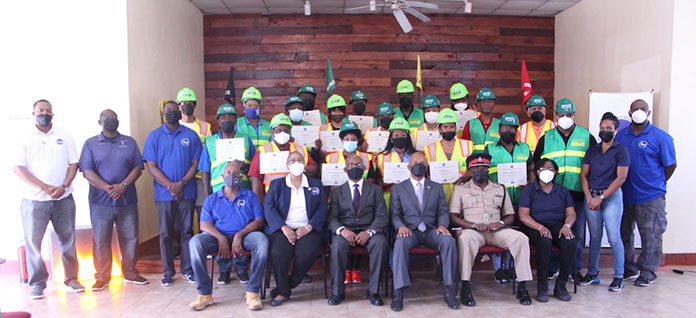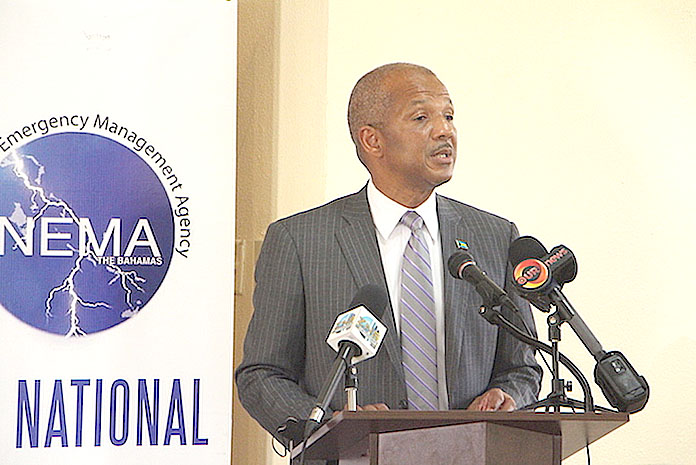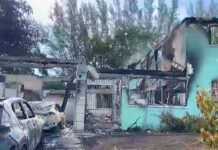

LaRoda at the podium during the Closing Ceremony and Presentation of
Certificates for Part II of NEMA’s Basic Community Emergency Response
Team (CERT) Training Programme. (BIS Photo/Mark Ford)
NASSAU, The Bahamas – Disaster Preparedness is a shared responsibility that calls for the involvement of everyone, Minister of State in the Office of the Prime Minister, the Hon. Myles K. LaRoda, told a recent graduating class of the National Emergency Management Agency’s CERT Programme.
Mr. LaRoda, who has responsibility for Disaster Preparedness, Management and Reconstruction, among his other duties, joined officials at the National Emergency Management Agency in encouraging even more Bahamian residents to become trained volunteers who “can help quickly in times of need.”
The State-Minister said community volunteers across The Bahamas can help to keep their communities safe during a disaster or emergency by joining a disaster response organization (such as CERT). This act, he said, will enable them to receive the “proper training” that will allow them to respond effectively to emergencies and/or disasters until Professional First Responders arrive.
Mr. LaRoda applauded the graduate volunteers for their decision to join the ranks of community volunteers who received certification through the NEMA/CERT Training Programme.
“Life-threatening injuries require immediate action to prevent an injured person from dying. Those nearest to someone with life-threatening injuries are best positioned to provide first care,” State Minister LaRoda said. “CERT offers an approach to volunteer training and organization that Professional First Responders can rely on during disaster situations, allowing them to focus on more complex tasks. “By joining a disaster response organization and receiving the proper training before an emergency hits, you can support First Responders and keep your communities safe. By working together, everyone can help to keep the nation safe from harm and keep it resilient when struck by hazards such as a hurricane or a pandemic.”
Addressing the Closing Ceremony and Presentation of Certificates for the country’s 18 most recent CERT Volunteers, Mr. LaRoda said it is essential to build a Culture of Preparedness in The Bahamas. (The CERT Training was a collaboration between NEMA and the Baillou Hill Estates Homeowners Association and Neighbourhood Watch. CERT Trainings were held March 21-25 and March 28 through April 1 at the Chapel on the Hill Compound, Tonique Williams-Darling Highway. Thirty-two community volunteers successfully completed the two sessions.)
“Emergencies and disasters may occur in our communities at any time, and oftentimes when we least expect them,” Mr. LaRoda said. “In order to be prepared to respond effectively to emergencies and disasters, the involvement of communities is crucial.”
The Community Emergency Response Team Programme educates community volunteers about disaster/emergency preparedness for the hazards that may impact their areas and trains them in basic disaster response skills such as fire safety and utility control, light search and rescue, disaster medical operations (including Basic First Aid and CPR Training), disaster preparedness, CERT and Terrorism, CERT Organization, and disaster psychology.







